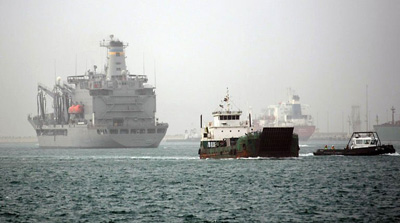By W.G. Dunlop

The five-ship North Atlantic Treaty Organisation mine-sweeping force had already sailed to Bahrain and Kuwait under the 2004 Istanbul Cooperation Initiative (ICI), which aims to increase security cooperation with the Middle East.
Tense ties between Gulf Arab states and Iran were exacerbated after the mid-March intervention of a Saudi-led Gulf force in Sunni-ruled Bahrain where security forces crushed a Shiite-led pro-democracy uprising.
The intervention sparked a war of words between various Gulf Arab states and their Iranian neighbour, with both sides trading accusations of meddling in Bahrain, and Arab states alleging Iranian interference in Kuwait.
The aim of the NATO mission, which is called “Operation INAS BAHR,” or “Friendly Seas,” is “to promote practical military cooperation with the countries of the Istanbul Cooperation Initiative,” said assistant staff officer Lieutenant Giampiero Sanna of the Italian navy.
It is “an excellent opportunity for military dialogue as a means to enhance understanding and promote cooperation,” a handout on the operation said.
Lieutenant Anastasios Soulas, an officer on the Greek frigate HS Spetsai, the force’s flagship, said the mission was planned long before uprisings that began in Tunisia and spread to other Arab states including Bahrain had even begun.
“This kind of trip had to be prepared a long time ago, a long time before all of these things,” Soulas said.
“What we can tell you for sure is that all these countries have given us a very warm welcome, and they have all done their best to enhance this kind of cooperation,” he said.
Various Western states, especially leading NATO member the United States, also have tense relations with Iran, accusing the Islamic republic of namely of seeking to acquire nuclear weapons and backing militants in Iraq.
Hulking military-grey US-flagged support ships from a separate force were also in Dubai’s Jebel Ali port, with machine-gun armed patrol boats marked US Navy standing guard.
The US Fifth Fleet has roughly 40 ships, including warships, coast guard and support vessels in its area of operations, which includes the Gulf, a spokesman said.
Mines in the Gulf posed a significant risk to both military and civilian ships during the 1980-1988 Iran-Iraq war, during which the United States and various Arab countries especially Saudi Arabia, backed Saddam Hussein’s Iraq.
The mining of the Straight of Hormuz off Iran, one of the most important transit points for oil in the world, remains a nightmare scenario for the oil-rich Gulf Arab states, the United States and other Western countries.
The five NATO vessels set out from Crete on January 22 and sailed through the Suez Canal and the Red Sea to Bahrain, Kuwait, and then the United Arab Emirates, Soulas said. They will head back through Suez on May 5.
He said that other stops were made along the way for logistics and to provide rest for the crew, but the official visits were limited to those three states.
The force’s several hundred Greek, Spanish Italian and German sailors set off for shore leave in Dubai after their April 10 arrival in the glitzy Gulf emirate, but they will be back to work for exercises with the UAE navy.
“During our visit to the United Arabian Emirates, we’ve planned a demanding program… with the UAE navy consisting of combined exercises” Captain Georgios Pelekanakis, the NATO force’s commander, said in a statement.
The NATO mine-sweeping force is currently made up of the HS Spetsai, which is not designed to counter mines but instead provides security for the four much smaller, lightly armed mine-sweeping ships — one each from Greece, Spain, Italy and Germany.
The force usually operates in the Mediterranean and the Black Sea, Sanna, adding that in addition to locating mines, the minesweepers can also identify shipwrecks and contribute to archaeological research.